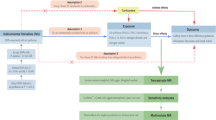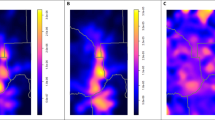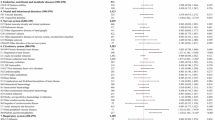Abstract
Background
The epidemiological evidence regarding the correlation between air pollution, residential greenspace, and the risk of kidney stone disease (KSD) is limited, with no large-scale prospective studies conducted on this relationship.
Objective
We conducted a large-scale prospective study from the UK Biobank to explore the correlation between air pollution, residential greenspace, and the risk of KSD.
Methods
This study included 419,835 UK Biobank participants who did not have KSD at baseline. An air pollution score was derived through the summation of concentrations for five air pollutants, including particulate matter (PM) with aerodynamic diameter ≤2.5 μm (PM2.5), ranging from 2.5 to 10 μm (PM2.5-10), ≤10 μm (PM10), nitrogen dioxide (NO2), and nitrogen oxides (NOx). Various covariates were adjusted for in Cox proportional hazard regression to evaluate the risk of KSD associated with air pollution score, single air pollutant, and residential greenspace.
Results
During a follow-up period of 12.7 years, 4503 cases of KSD were diagnosed. Significant associations were found between KSD risk and air pollution score (HR: 1.08, 95% CI: 1.03–1.13), PM2.5 (1.06, 1.02–1.11), PM10 (1.04, 1.01–1.07), NO2 (1.09, 1.02–1.16), NOx (1.08, 1.02–1.11), greenspace buffered at 300 m (0.95, 0.91–0.99), and greenspace buffered at 1000 m (0.92, 0.86–0.98) increase per interquartile range (IQR). PM2.5 and NO2 reductions may be a key mechanism for the protective impact of residential greenspace on KSD (P for indirect path < 0.05).
Impact
-
Prolonged exposure to air pollution was correlated with a higher risk of KSD, while residential greenspace exhibits an inverse association with KSD risk, partially mediated by the reduction in air pollutants concentrations. These findings emphasize the significance of mitigating air pollution and maintaining substantial greenspace exposure as preventive measures against KSD.
This is a preview of subscription content, access via your institution
Access options
Subscribe to this journal
Receive 6 print issues and online access
$259.00 per year
only $43.17 per issue
Buy this article
- Purchase on SpringerLink
- Instant access to full article PDF
Prices may be subject to local taxes which are calculated during checkout



Similar content being viewed by others
Data availability
The UK Biobank data are available on application to the UK Biobank (https://www.ukbiobank.ac.uk/).
Code availability
The computer code utilized to generate results pivotal to this paper’s conclusions is available upon request. Due to data sensitivity, please contact the corresponding author to access the code.
References
Scales CD, Smith AC, Hanley JM, Saigal CS. Urologic Diseases in America Project. Prevalence of kidney stones in the United States. Eur Urol. 2012;62:160–5.
Fink HA, Wilt TJ, Eidman KE, Garimella PS, MacDonald R, Rutks IR, et al. Medical management to prevent recurrent nephrolithiasis in adults: a systematic review for an American College of Physicians Clinical Guideline. Ann Intern Med. 2013;158:535–43.
Morgan MSC, Pearle MS. Medical management of renal stones. BMJ. 2016;352:i52.
Khan SR, Pearle MS, Robertson WG, Gambaro G, Canales BK, Doizi S, et al. Kidney stones. Nat Rev Dis Prim. 2016;2:16008.
Wild CP. Complementing the genome with an ‘exposome’: the outstanding challenge of environmental exposure measurement in molecular epidemiology. Cancer Epidemiol Biomark Prev Publ Am Assoc Cancer Res Cosponsored Am Soc Prev Oncol. 2005;14:1847–50.
Münzel T, Sørensen M, Hahad O, Nieuwenhuijsen M, Daiber A. The contribution of the exposome to the burden of cardiovascular disease. Nat Rev Cardiol. 2023;20:651–69.
Al-Kindi SG, Brook RD, Biswal S, Rajagopalan S. Environmental determinants of cardiovascular disease: lessons learned from air pollution. Nat Rev Cardiol. 2020;17:656–72.
Kuźma, Dąbrowski EJ, Kurasz A, Święczkowski M, Jemielita P, Kowalewski M, et al. Effect of air pollution exposure on risk of acute coronary syndromes in Poland: a nationwide population-based study (EP-PARTICLES study). Lancet Reg Health Eur. 2024;41:100910.
Kuźma Ł, Roszkowska S, Święczkowski M, Dąbrowski EJ, Kurasz A, Wańha W, et al. Exposure to air pollution and its effect on ischemic strokes (EP-PARTICLES study). Sci Rep. 2022;12:17150.
Brook RD, Rajagopalan S, Pope CA, Brook JR, Bhatnagar A, Diez-Roux AV, et al. Particulate matter air pollution and cardiovascular disease: An update to the scientific statement from the American Heart Association. Circulation. 2010;121:2331–78.
Sørensen M, Daneshvar B, Hansen M, Dragsted LO, Hertel O, Knudsen L, et al. Personal PM2.5 exposure and markers of oxidative stress in blood. Environ Health Perspect. 2003;111:161–6.
Kuźma Ł, Kurasz A, Dąbrowski EJ, Dobrzycki S, Bachórzewska-Gajewska H. Short-Term Effects of “Polish Smog” on Cardiovascular Mortality in the Green Lungs of Poland: A Case-Crossover Study with 4,500,000 Person-Years (PL-PARTICLES Study). Atmosphere. 2021;12:1270.
Lee W, Wu X, Heo S, Fong KC, Son J-Y, Sabath MB, et al. Associations between long term air pollution exposure and first hospital admission for kidney and total urinary system diseases in the US Medicare population: nationwide longitudinal cohort study. BMJ Med. 2022;1. https://doi.org/10.1136/bmjmed-2021-000009.
Kuźma Ł, Małyszko J, Bachórzewska-Gajewska H, Kralisz P, Dobrzycki S. Exposure to air pollution and renal function. Sci Rep. 2021;11:11419.
Afsar B, Elsurer Afsar R, Kanbay A, Covic A, Ortiz A, Kanbay M. Air pollution and kidney disease: review of current evidence. Clin Kidney J. 2018;12:19–32.
Aizezi X, Xie L, Xie H, Li J, Shang Z, Liu C. Epidemiological and clinical characteristics of stone composition: a single-center retrospective study. Urolithiasis. 2022;50:37–46.
Xu H, Liu Y, Wang J, Jin X. Short-term effects of ambient air pollution on emergency department visits for urolithiasis: A time-series study in Wuhan, China. Front Public Health. 2023;11:1091672.
Yang B-Y, Zhao T, Hu L-X, Browning MHEM, Heinrich J, Dharmage SC, et al. Greenspace and human health: An umbrella review. Innov Camb Mass. 2021;2:100164.
Kivimäki M, Batty GD, Pentti J, Nyberg ST, Lindbohm JV, Ervasti J, et al. Modifications to residential neighbourhood characteristics and risk of 79 common health conditions: a prospective cohort study. Lancet Public Health. 2021;6:e396–e407.
Gianfredi V, Buffoli M, Rebecchi A, Croci R, Oradini-Alacreu A, Stirparo G, et al. Association between Urban Greenspace and Health: A Systematic Review of Literature. Int J Environ Res Public Health. 2021;18:5137.
Sudlow C, Gallacher J, Allen N, Beral V, Burton P, Danesh J, et al. UK biobank: an open access resource for identifying the causes of a wide range of complex diseases of middle and old age. PLoS Med. 2015;12:e1001779.
Caleyachetty R, Littlejohns T, Lacey B, Bešević J, Conroy M, Collins R, et al. United Kingdom Biobank (UK Biobank): JACC Focus Seminar 6/8. J Am Coll Cardiol. 2021;78:56–65.
Beelen R, Hoek G, Vienneau D, Eeftens M, Dimakopoulou K, Pedeli X, et al. Development of NO2 and NOx land use regression models for estimating air pollution exposure in 36 study areas in Europe – The ESCAPE project. Atmos Environ. 2013;72:10–23.
Eeftens M, Beelen R, de Hoogh K, Bellander T, Cesaroni G, Cirach M, et al. Development of Land Use Regression models for PM(2.5), PM(2.5) absorbance, PM(10) and PM(coarse) in 20 European study areas; results of the ESCAPE project. Environ Sci Technol. 2012;46:11195–205.
Wang M, Zhou T, Song Y, Li X, Ma H, Hu Y, et al. Joint exposure to various ambient air pollutants and incident heart failure: a prospective analysis in UK Biobank. Eur Heart J. 2021;42:1582–91.
Mozaffarian D. Dietary and Policy Priorities for Cardiovascular Disease, Diabetes, and Obesity: A Comprehensive Review. Circulation. 2016;133:187–225.
Noh TI, Hong J, Kang SH, Jung J. Association of meteorological factors and ambient air pollution on medical care utilization for urolithiasis: a population-based time-series study. BMC Nephrol. 2021;22:402.
Bräuner EV, Forchhammer L, Møller P, Simonsen J, Glasius M, Wåhlin P, et al. Exposure to ultrafine particles from ambient air and oxidative stress-induced DNA damage. Environ Health Perspect. 2007;115:1177–82.
Khan SR, Canales BK, Dominguez-Gutierrez PR. Randall’s plaque and calcium oxalate stone formation: role for immunity and inflammation. Nat Rev Nephrol. 2021;17:417–33.
Khan SR, Gambaro G. Role of Osteogenesis in the Formation of Randall’s Plaques. Anat Rec Hoboken NJ. 2016;299:5–7.
Losacco C, Perillo A. Particulate matter air pollution and respiratory impact on humans and animals. Environ Sci Pollut Res Int. 2018;25:33901–10.
Persinger RL, Poynter ME, Ckless K, Janssen-Heininger YMW. Molecular mechanisms of nitrogen dioxide induced epithelial injury in the lung. Mol Cell Biochem. 2002;234–235:71–80.
Khan SR. Reactive oxygen species as the molecular modulators of calcium oxalate kidney stone formation: evidence from clinical and experimental investigations. J Urol. 2013;189:803–11.
Hirose M, Yasui T, Okada A, Hamamoto S, Shimizu H, Itoh Y, et al. Renal tubular epithelial cell injury and oxidative stress induce calcium oxalate crystal formation in mouse kidney. Int J Urol J Jpn Urol Assoc. 2010;17:83–92.
Chen C, Li H, Niu Y, Liu C, Lin Z, Cai J, et al. Impact of short-term exposure to fine particulate matter air pollution on urinary metabolome: A randomized, double-blind, crossover trial. Environ Int. 2019;130:104878.
Li G-X, Duan Y-Y, Wang Y, Bian L-J, Xiong M-R, Song W-P, et al. Potential urinary biomarkers in young adults with short-term exposure to particulate matter and bioaerosols identified using an unbiased metabolomic approach. Environ Pollut Barking Essex. 2022;305:119308.
Sun Y, Zhou Q, Zheng J. Nephrotoxic metals of cadmium, lead, mercury and arsenic and the odds of kidney stones in adults: An exposure-response analysis of NHANES 2007-2016. Environ Int. 2019;132:105115.
Wu M, Liu M, Zhang Y, Wu J, Gao M, Huang F, et al. Serum HDL partially mediates the association between exposure to volatile organic compounds and kidney stones: A nationally representative cross-sectional study from NHANES. Sci Total Environ. 2023;907:167915.
Zhou X, Jin K, Qiu S, Yang Q, Wang P, Zhan Y, et al. Associations of exposure to polycyclic aromatic hydrocarbons and kidney stones in U.S. general population: results from the National Health and Nutrition Examination Survey 2007-2016. World J Urol. 2022;40:545–52.
Lachowycz K, Jones AP. Greenspace and obesity: a systematic review of the evidence. Obes Rev J Int Assoc Study Obes. 2011;12:e183–189.
Nieuwenhuijsen MJ. Urban and transport planning, environmental exposures and health-new concepts, methods and tools to improve health in cities. Environ Health Glob Access Sci Source. 2016;15:38.
Derkzen ML, van Teeffelen AJA, Verburg PH. REVIEW: Quantifying urban ecosystem services based on high-resolution data of urban green space: an assessment for Rotterdam, the Netherlands. J Appl Ecol. 2015;52:1020–32.
Brook RD, Franklin B, Cascio W, Hong Y, Howard G, Lipsett M, et al. Air pollution and cardiovascular disease: a statement for healthcare professionals from the Expert Panel on Population and Prevention Science of the American Heart Association. Circulation. 2004;109:2655–71.
Pope CA, Burnett RT, Thurston GD, Thun MJ, Calle EE, Krewski D, et al. Cardiovascular mortality and long-term exposure to particulate air pollution: epidemiological evidence of general pathophysiological pathways of disease. Circulation. 2004;109:71–77.
Acknowledgements
This research has been conducted using the UK Biobank Resource under Application Number 93044. We extend our gratitude to all the participants and the UK Biobank team for their valuable contributions.
Funding
The study was supported by the National Natural Science Foundation of China (82373337 to JC, 82170781 and 82370772 to HC) and Hunan Province Young talents Program (2021RC3027 to JC).
Author information
Authors and Affiliations
Contributions
ML: formal analysis, investigation, methodology, visualization, writing – original draft; MG and HC: data curation, methodology, software, writing – review & editing; ZZ, JH and JW: formal analysis, validation, writing – review & editing; XK: investigation, visualization, writing – review & editing; JC: conceptualization, methodology, project administration, supervision, writing – review & editing.
Corresponding authors
Ethics declarations
Competing interests
The authors declare no competing interests.
Ethical approval and consent to participate
The UK Biobank was approved by the North West Research Ethics Committee (11/NW/0382). All the participants had signed informed consent.
Consent to publish
All authors read and approved the final manuscript.
Additional information
Publisher’s note Springer Nature remains neutral with regard to jurisdictional claims in published maps and institutional affiliations.
Supplementary information
Rights and permissions
Springer Nature or its licensor (e.g. a society or other partner) holds exclusive rights to this article under a publishing agreement with the author(s) or other rightsholder(s); author self-archiving of the accepted manuscript version of this article is solely governed by the terms of such publishing agreement and applicable law.
About this article
Cite this article
Liu, M., Gao, M., Zhu, Z. et al. Air pollutants, residential greenspace, and the risk of kidney stone disease: a large prospective cohort study from the UK Biobank. J Expo Sci Environ Epidemiol 35, 859–867 (2025). https://doi.org/10.1038/s41370-024-00728-0
Received:
Revised:
Accepted:
Published:
Issue date:
DOI: https://doi.org/10.1038/s41370-024-00728-0



